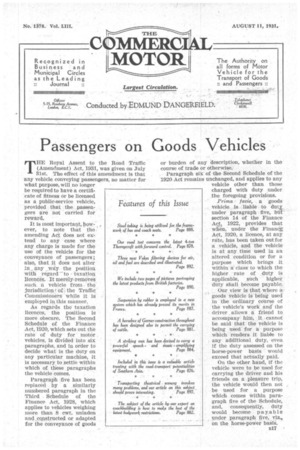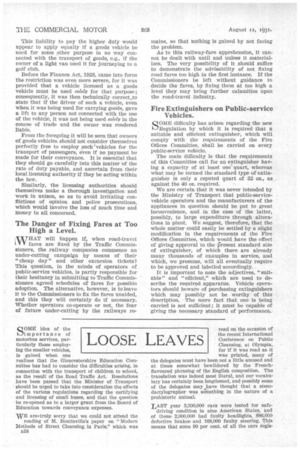Passengers on Goods Vehicles
Page 31

Page 32

If you've noticed an error in this article please click here to report it so we can fix it.
TIIE Royal Assent to the Road Traffic (Amendment) Act, 1931, was given on July 31st. The effect of this amendment is that any vehicle conveying passengers, no matter felwhat purpose, will no longer be required to have a certifi Oate of fitness or be licensed as a public-service vehicle, provided that the passengers are not carried for reward.
It is most important, however, to note that the amending Act does not ex tend to any case where any charge is made for the use of the vehicle for the conveyance of passengers; also, that it does not alter _ any way the position with regard to taxation licenceS. It merelpremoVes, such a vehicle from the' jurisdiction of the Traffic Commissioners while it is employed in this manner.
As regards the taxation licences, the position is more obscure. The Second Schedule of the Finance Act, 1920, which sets out the rate of duty for motor . vehicles, is divided into six paragraphs, and in order to decide what is the duty on any particular machine, it is necessary to settle within which of these paragraphs the vehicle comes.
Paragraph :five has been replaced by a similarly numbered paragraph in the Third Schedule of the Finance Act, 1928, which applies to vehicles weighing more than 8 cwt. unladen and _constructed. or adapted for the conveyance of goods or burden of any description, whether in the course of trade or otherwise.
Paragraph six of the Second Schedule of the 1920 Act remains unchanged, and applies to any vehicle other than those charged with duty under the foregoing provisions.
Prima facie, a goods vehicle is liable to dutz under paragraph five, but ' section 14 of the Finance Act, 1922, provides that when, under the Finaneg Act, 1920, a licence, at any rate, has been taken out for a vehicle, and the vehicle is at any time used in an altered condition or for a purpose which brings it within a. class to which the higher rate of duty is applicable, 5uch higher duty shall become payable; Our view is that where agoods vehicle is being used in the ordinary course of the vehicle's work and the driver allows a friend to accompany him, it cannot be said that the vehicle is bang used for a purpose which renders it liable to any additional duty, even if the duty aSsessed on the horse-power basis would exceed that actually paid.
On the other hand, if the vehicle were to be used for carrying the driver and his friends on a pleasure trip, the vehicle would then not be used for a purpose which comes within paragraph five of the Schedule, and, consequently, duty would become payable tinder paragraph five, viz., on the horse-power This liability to pay the higher duty would appear to apply equally if a goods vehicle be used for some other purpose in no way connected with the transport of goods, e.g., if the owner of a light van used it for journeying to a golf club.
Before the Finance Act, 1928, came into force the restriction was even more severe, for it was provided that a vehicle licensed as a goods vehicle must be used solely for that purpose; consequently, it was then technically correct ,to state that if the driver of such a vehicle, even when it was being used for carrying goods, gave a lift to any person not connected with the use of the vehicle, it was not being used solely in the course of trade and the owner was rendered liable.
From the foregoing it will be seen that owners of goods vehicles should not consider themselves perfectly free to employ such 'vehicles for the transport of passengers, even if no payment be made for their conveyance. It is essential that they should go carefully into this matter of the rate of duty payable, and ascertain from their local licensing authority if they be acting within the law.
Similarly, the licensing authorities should themselves make a thorough investigation and work in unison, so as to avoid irritating conflictions of opinion and police prosecutions, which would involve the loss of much time and money to all concerned.




























































































